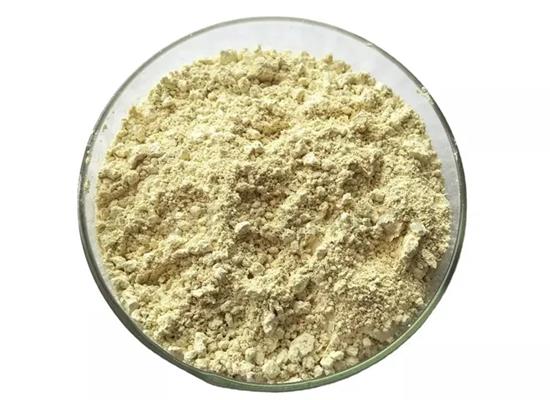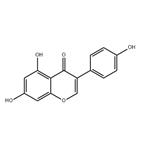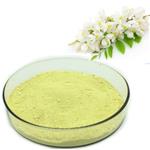Genistein: Natural Source and Pharmacological Effect
Jul 4,2024
General Description
Genistein, a potent isoflavone mainly sourced from soy-based foods, exhibits diverse pharmacological effects with potential health benefits. It plays a crucial role in inhibiting tumor cell growth, preventing cancer, ameliorating post-menopausal symptoms, and reducing the risk of cardiovascular diseases. Moreover, it shows promise in managing metabolic disorders like obesity and diabetes, exerts anti-inflammatory effects, and offers neuroprotective benefits. Genistein's mechanisms include regulating cell cycle regulators, modulating insulin secretion, enhancing cognitive function, and antioxidative properties. Further research into its molecular targets and mechanisms is essential to fully unlock its therapeutic potential in various health conditions.

Figure 1. Genistein
Natural Source
Abundant in Soy-Based Foods
Genistein, a potent isoflavone, is predominantly sourced from leguminous plants, particularly soy-based foods like soy milk, soy flour, soy protein isolate, and tempeh. Raw mature soybeans, for instance, contain an average of 80.99 mg of genistein per 100 g. Beyond soybeans, other legumes such as lupin, broad beans, and chickpeas also contain varying amounts of genistein, typically ranging from 0.2 to 0.6 mg per 100 g. In contrast, genistein content in fruits, vegetables, and nuts is comparatively lower, ranging between 0.03 mg to 0.2 mg per 100 g.
Abundant in Soy-Based Foods
Notably, soy-based infant formula has been available since the 1960s, contributing significantly to genistein intake among infants. Studies indicate that infants consuming soy-based formula show increased plasma concentrations of isoflavones, including genistein, with no observed adverse health effects compared to those on cow milk formula. Genistein exists in two primary forms in soy-based foods: as a glycoside, where it is conjugated with a sugar molecule, and as an aglycone, which is the unconjugated form. Upon ingestion, enzymes in the intestine hydrolyze glycoside genistein to release the aglycone form, which is biologically active. This process facilitates the absorption of genistein into the bloodstream, where it circulates at levels influenced by dietary intake, typically ranging from 0.5 μM in adults consuming moderate to high amounts of soy-based foods to higher concentrations in infants exposed to soy-based formulas. Overall, soy-based foods stand out as the primary dietary source of genistein, contributing significantly to its intake and biological activity in human metabolism. 1
Pharmacological Effect
Genistein, a phytoestrogen found in soybeans and other legumes, exhibits a diverse array of pharmacological effects with potential health benefits.
Ameliorating Post-menopausal Symptom
Notably, genistein shows promise in ameliorating post-menopausal symptoms, reducing the risk of cardiovascular diseases, as well as preventing breast and prostate cancers. One of its key mechanisms of action is its ability to inhibit tumor cell growth by regulating cell cycle regulators like cyclin-dependent kinases, thereby halting cancer progression. Moreover, genistein can indirectly affect tumor cell proliferation by interfering with insulin-like growth factor 1 (IGF-1) and inhibiting transforming growth factor-β (TGFβ) signaling pathways. It also induces apoptosis in tumor cells by modulating regulatory genes such as Akt and NFκB.
Antioxidant Effect
Additionally, genistein exhibits antioxidant properties, reverses promoter hypermethylation of tumor suppressor genes, and enhances the expression of antioxidant enzymes, collectively contributing to its anticancer effects. Beyond cancer prevention, genistein also demonstrates benefits in metabolic disorders like obesity, type 2 diabetes mellitus, and atherogenesis. It promotes insulin secretion, enhances insulin receptor sensitivity, and inhibits cortisol synthesis, offering potential therapeutic implications in managing these conditions.
Anti-inflammatory Effect
Furthermore, genistein exerts anti-inflammatory effects by modulating immune responses and reducing inflammatory cytokine levels. In the realm of neuroprotection, genistein has shown promising effects in memory enhancement, learning ability improvement, and neuroprotection. Its ability to cross the blood-brain barrier allows it to upregulate nerve growth factors and choline acetyltransferase, key players in cognitive function. Additionally, genistein's antioxidant properties safeguard against oxidative stress, suppress amyloid-beta-induced toxicity, and maintain calcium homeostasis in neurons, thus potentially mitigating neurodegenerative disorders.
In conclusion, genistein's multifaceted pharmacological effects make it a promising candidate for the prevention and treatment of various health conditions, ranging from cancer and metabolic disorders to neurodegenerative diseases. Further research into its molecular targets and mechanisms of action is essential to fully harness its therapeutic potential. 2
Reference
1. Dixon RA, Ferreira D. Genistein. Phytochemistry. 2002 Jun; 60(3): 205-211.
2. Li R, Robinson M, Ding X, Geetha T, Al-Nakkash L, Broderick TL, Babu JR. Genistein: A focus on several neurodegenerative diseases. J Food Biochem. 2022 Jul; 46(7): e14155.
- Related articles
- Related Qustion
Oxaliplatin's unique pharmacological action and incorporation into key regimens advance cancer treatment and improve clinical outcomes in modern oncology.....
Jul 4,2024APIDimethylamine hydrochloride's chemical structure enhances stability and reactivity in industrial processes but necessitates rigorous safety precautions due to inherent hazards.....
Jul 4,2024APIGenistein
446-72-0You may like
- Genistein
-

- $1.00 / 1KG
- 2024-07-29
- CAS:446-72-0
- Min. Order: 1KG
- Purity: 99%
- Supply Ability: 20000KG
- Genistein powder 50-98%Sophora Japonica Extract
-

- $0.00 / 1kg
- 2024-07-23
- CAS:446-72-0
- Min. Order: 1kg
- Purity: 50-98%
- Supply Ability: 100000
- Genistein Sophora Japonica Extract
-

- $0.00 / 1kg
- 2024-07-23
- CAS:446-72-0
- Min. Order: 1kg
- Purity: 98%
- Supply Ability: 100000




